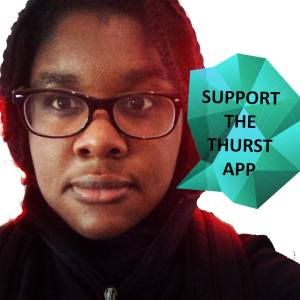Online dating is now acceptable, if not expected. But people of color, particularly queer people of color, are often met with racism, prejudice, exoticism and fetishization in the online dating scene.
Masked by anonymity, some white folk use online dating sites to harass people of color with relatively little, if any, consequences. People of color are often marginalized in the online dating stratosphere, and have few options for comfortably fulfilling our romantic and sexual needs in a safe digital environment.
But one woman, a Black queer woman, is seeking to change that.
Meet Morgen Bromell, Chief Executive Officer of Thurst, the first online dating app exclusively catering to the nuanced needs of queer people, especially queer people of color. An undergraduate of Northeastern University and Pratt Institute, with experience working at a MIT startup, Morgen’s comprehensive background in entrepreneurship, business, finance, humanities, art, and design, congealed into the development of an app that’s the first of it’s kind.
“There isn’t a place for marginalized queer people to connect and date online. I think one of the great violences of our generation has been denying marginalized people, whether you’re queer, black, or both, platform and spaces to see ourselves and others like us. I think Thurst is just one of the projects arising out of the desire to see ourselves online, to make our own space.” – Morgen Bromell, CEO
Born from frustration, Thurst is Morgen’s brainchild. After realizing how “restrictive and lame” other dating sites were, she put into context that most dating sites weren’t meant for people like her. Popular online dating sites like and OKCupid and Tindr were created by cis-gender white men who weren’t necessarily thinking of the complex romantic nuances that the most marginalized communities face.
With a just a notepad and some doodles, Morgen’s designs excited her.
“I realized I wanted this to actually exist, not just as a late night coffee fueled dream, but as a real app. That’s how it began.”
With just a small team composed of herself and a three-person advisory board, Morgen’s made tremendous strides in concretizing her caffeine-fueled concept. The website, beautiful in its design and deliberate in its navigation, details how comprehensive and intentional the app is in creating welcoming spaces for “queer, cis, trans, and non-binary folk who are seeking to connect in person.”
The app boasts secure levels of privacy and security, special options for kink and fetish, filters based on racial, gender, and even political distinctions, and aggressive reporting and blocking mechanisms for trolls, racists, and violators who disrupt, harass, and abuse its members.
“I receive messages regularly from folks who are really excited that this could be happening or from people who finally get to express their full identity and have hopes of dating without fear of violence or major triggers for the first time. That’s enough for me to want to keep going.”
The humane element underpinning its mission also extends to its fundraising. With a crowdsource goal of $55,000, Morgen has every intention of paying developers and students of color for their labor.
“When we talk about being less oppressive, that also includes paying people. I will work for free, but it’s my project. I cannot expect others to feel the same. The mythos of struggle, starvation, and hustle around startups…is inherently toxic for oppressed people.”
But the corporate establishment is starting to take interest. At the recent Lesbians Who Tech Summit, Morgen met with a number of self-identified queer technologists and industry leaders who were impressed with her concept and excited about its possibilities.
The press is also taking notice; Thurst has been featured in The Daily Dot, Black Girl Nerds, USA Today, and Mask Magazine.
The app is projected to go live in 2016. This year will be spent doing nerdy tech things. It’ll also be an important year for fundraising to ensure her team of minority technologists eat. Please donate here.
Thurst is gonna revolutionize the queer online dating space. It uses technology (a field notoriously inaccessible to minorities and women) to reinvigorate the online dating scene with more inclusive and reflective standards that create security and representation for queer people, especially queer people of color.
This post was brought to you by Blackmillennials.com.
Want more stuff like this? Subscribe to our weekly digest below.
[mc4wp_form]

